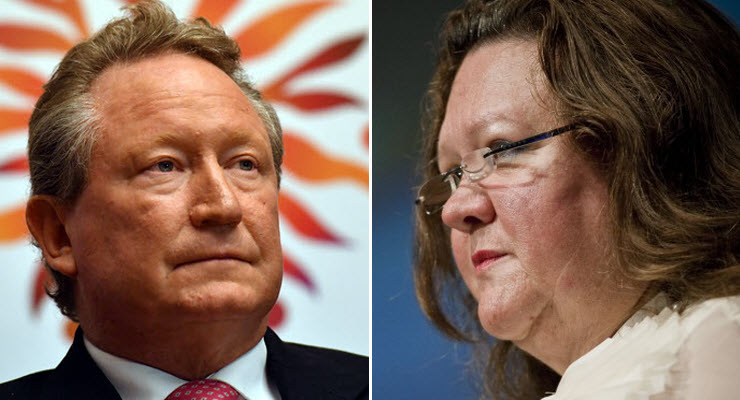
It’s probably best that Andrew “Twiggy” Forrest took delivery of his new $100 million private jet last week given the global post-COVID push for higher tax rates on everyone from corporates to the super wealthy.
Otherwise we might have had to suffer another PR stunt of “poor” Twiggy on the back of a flatbed truck, megaphone in hand, alongside fellow WA iron ore billionaire Gina Rinehart, chanting “axe the tax” as they did in response to Rudd’s incendiary resources super profits tax (RSPT).
I mean it just wouldn’t have the same impact on a tarmac with a Bombardier Global Express 7500 in the background.
At that 2010 rally Twiggy even went so far as to accuse the government of turning into a communist dictatorship and compared Australia unfavourably with the more “capitalist” China. Yes, he was at it even back then.
While Twiggy and Gina are both now among Australia’s larger taxpayers (everything is relative), that’s due to the billions they are raking in on the current iron ore boom which is obviously benefiting WA taxpayers and Australia as a whole.
But it has also prompted calls for a revival of that original mining tax from the 2010 Henry tax review. Last month the Greens released a paper claiming the RSPT would have raised an extra $34.6 billion. The paper also proposed a 6% “wealth tax” on billionaires like Twiggy, Gina and Clive Palmer to combat inequality.
But this time their proposals are not quite so extreme, given a worldwide push for governments to raise taxes to overcome the giant deficits left by the coronavirus economic shock.
Last weekend even the International Monetary Fund (IMF) appeared to be channelling Greens policy with a report suggesting taxes on “excess” profits such as the ill-fated mining resource rent tax. And to be fair, the IMF report also suggested other nations could follow the Abbott government’s temporary budget repair levy which it brought in between 2014 and 2017.
The push for higher taxes for the top end of town is gaining speed around the world. In early March, Boris Johnson’s conservative government hiked corporate taxes from 19% to 25% to pay for COVID, reversing a previous policy to bring them down to 17%.
The Biden administration has already been warning it will raise taxes on businesses and the wealthy to fund its ambitious $3 trillion infrastructure spend. Overnight, US Treasury Secretary Janet Yellen used her first major address to call for a minimum global corporate tax rate to stop the “race to the bottom”. She specifically referred to a more level playing field in the taxing of multinational corporations and discouraging profit shifting, an area in which Australia has received credit for its strong efforts in recent years.
Meanwhile across the Tasman, the NZ government announced major tax changes last week which included increasing the top tax rate for the country’s highest earners to 39%. More importantly, it had the balls to kill off its version of negative gearing in an attempt to wrestle control of a runaway housing market.
Can’t wait to see how brave our lot will be in the budget to be announced five weeks from today.
Should the Australian government increase taxes on the super wealthy? Let us know your thoughts by writing to letters@crikey.com.au. Please include your full name to be considered for publication in Crikey’s Your Say section.








Is Twiggy really one of Australia’s largest tax payers? Don’t his FMG dividends go to his own charity which presumably claims the associated franking credits?
He’s only too happy to announce projects undertaken by his charity and indulge in a back-patting circle jerk. And let’s not forget his great invention, the cashless welfare card, which is really a money-laundering scheme for the National Party.
Charity is not the correct term. It is a tax avoidance scheme.
He raises his own “taxes” -> to redistribute his own wealth to his own DIY deemed share of ‘deserving’ welfare programs.
Saves on ‘government meddling/interference’.
… A sort of “Sheriff of Rockingham”?
The Indue card says all you need to know about his ‘charity’. His interest in ending slavery? INDUE is financial slavery.
We need to return to the massive taxes imposed on the rich that were in force world wide in the 50’s & 60’s when prosperity meant everyone shared not just the ruthless rich.. But imagine the screaming from the bought off pollies, lobbyists, accountants and merde orc ifd any form of real effective taxation was imposed.
It is ironic, but, alas, not in the least unexpected that the Boomers – who benefitted from the early tax regime – would be the ones to demand tax cuts.
Just as they pulled up the free tertiary education ladder, gutted single parent & U/E benefits and were at the forefront of virtually ALL of the most regressive social policies of the last 30 years.
Indeed, Agni – a pathologically self-indulgent generation and one of the few that left a worse world for subsequent generations (barring a major external event like a world war) – and absolutely no insight (or care) into it.
Dont count me in that description.
Me neither as an individual, Andrew, but it certainly applies to us as a political generation, as Agni details above. And there’s a large proportion of our generation for which my description is a polite understatement (eg the whining and outrage from the self-funded, low-taxed and smugly entitled retirees over the potential loss of their franking credits during the last election campaign was truly sickening – self-funded retirees being by definition the richest 20% of retirees).
It dovetails nicely with the American cult of you can be what ever you want to be- the cult of the individual. The worship of wealth, & shallow people. We have been colonised by American greed & culture.
As The Stranglers sang, “beware of the skin deep“.
Saying it’s the boomers, while no doubt psychologically satisfying, is both intellectually lazy and incorrect. Having recourse to battles of generations is a right wing standby to distract from meaningful social divisions that actually generate inequality between sections of the population. From sexism, women’s lib was a “boomer phenomenon” by the way, to the power and wealth of the 1%. The era you were born into will shape the life you experience but so will where and to which parents, as well as what you do. As a collective willed agent, generations are peripheral at best. They are a useful market research category but just one of many, aspirationals for example, or young families.
Generally true AP7, but not in the case of boomers. Their numbers are such that the politics has followed them, all the way. The regeneration and renewal of their teenage and young adult years was great for society, but all since then has been retrograde as the politics followed the numbers. Personal sacrifice was not part of their experience, so they demanded and they received.
Yes, lest we forget. I remember a retired Muhammad Ali mentioning (not complaining, mind you) that at one stage he was paying a marginal income tax rate of 90% – in that bastion of socialism, the USA.
Or the Beatles’ song “Taxman”.
Just an historical note for those ingenue too young to recall how progressive taxation worked- the high rates cited were NEVER levied on the full income (as usually claimed by the Right) but that above a given bracket.
Failing a return to such halcyon days – the tradies would be weaponised by Moloch – there is the option to levy annual wealth taxes or surcharges.
On. Gross. Income.
100%. The billions they are blowing up & carting away comes from stolen land.
The billionaires are fat from stolen wealth- twice stolen- first from the Traditional Owners, then from the Crown.
It seems a surreal point in history when we as a democratically elected country choose politicians who prioritise enhancing those already wealthy beyond their capacity to spend it while keeping millions in our near poverty. I don’t get it.
Nor do I.
Except in my most uncharitable and harsh view of our species.
Daily.
It’s called hegemony. Or you can opt for Lincoln’s you can fool some of the people all the time, and all of the people some of the time. The former is more rigorous the latter provides a little more hope.
Backgrounded as many governments, including Australia’s LNP, are compelled to have flatter and lower top end taxes to support the ‘trickle down’ effect (or ‘Laffer curve’); now a basic tenet of radical right libertarian economics.
When ABC’s Alberici criticised this as ungrounded theory, she was attacked relentlessly by the LNP, NewsCorp et al. yet silence from all those in media with economics degrees, who seemed to support the ‘gatekeepers’ or ‘top people’, but not grounded economics?
Whenever I see Rhinehart, there’s an echo of her rant against the mining tax: “the government can’t keep withdrawing from the ATM of the mining industry…”
She seemed to think no-one knows the source of her obscene wealth…derived from her father’s 3% royalty extracted from the ATM of the mining industry.
Rentseekers.